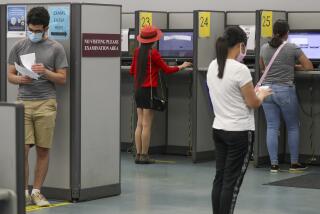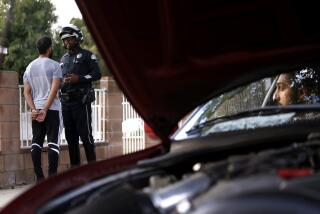Tracking Dangerous Drivers Nationwide
- Share via
Who are the worst drivers in America? Perhaps Willis Curry would qualify for the recognition, based on evidence in a recent trial that ended with his conviction on charges of involuntary manslaughter.
The tragic story of how a 17-year-old honor student was killed in an accident involving Curry’s truck in August has spurred Congress to attempt to redress the serious weaknesses of state licensing systems across the nation.
Curry was driving a Diamond Reo dump truck, loaded with 57,000 pounds of dirt, when it overturned in the District of Columbia onto the car driven by Benjamin E. Cooper, killing the high school student.
The dump truck’s brakes were worn down to the metal rivets of the brake linings and its brake drums were cracked, according to two mechanics and an engineer who testified at the trial. Witnesses testified the truck appeared to be speeding and ran a red light just before the crash.
Curry was no newcomer to traffic problems. He had received at least 31 traffic violations over the previous 10 years and was violating restrictions imposed on his driving privileges at the time of the accident. He had been involved in two injury crashes in the year prior to the fatal accident, and the truck had been cited for more than 200 safety violations.
The truck’s owner, James W. Byrd, who remains the focus of a criminal investigation, invoked the 5th Amendment at the trial. Federal regulators, meanwhile, closed down the trucking company J&D; Byrd, in September.
How can somebody with 31 traffic violations continue to drive a commercial vehicle? That’s the question that Congress asked in the aftermath of the accident, and the answer points up serious shortcomings in the nation’s licensing system.
The National Highway Traffic Safety Administration operates the National Drivers Register, a computer database that is meant to ensure that a driver whose license has been suspended or revoked in one state cannot obtain a license in other states.
The register now contains the names of 29 million Americans who have been convicted of criminal driving offenses or have revoked or suspended licenses.
There are an estimated 175 million licensed drivers in America--meaning that about 15% of drivers are so lousy that they are either convicts or have lost their licenses.
*
But the register contains only the names of people who have been convicted or whose licenses have been suspended or revoked. It does little to prevent a problem driver from obtaining a license in another state before his or her license is revoked. It was such weaknesses in the District of Columbia’s licensing system that allowed Curry, a Maryland resident, to get a license and continue driving in D.C. His case led to the dismissal of two senior administrators in the district.
The new federal transportation bill that was just approved by Congress calls for a study of expanding the National Drivers Register to include data on every American driver, according to Bill Holden, who operates the register.
If such data were national, when a driver seeks a license, the register would allow state officials to check whether the person is already licensed in another state and then obtain his or her prior driving record.
Would the system make sense or is it another clumsy intrusion of the federal government into the affairs of states? The safety administration did a study of the current patchwork of systems meant to tie together data on the nation’s drivers and concluded that a unified federal system would be a good idea, Holden said.
Moreover, it does not represent a federalization of drivers’ licenses, but simply the use of federal authority to coordinate information among the states, he said.
“There are drivers out there who do not obey the law,” Holden said.
* Vartabedian cannot answer mail personally but will attempt to respond in this column to automotive questions of general interest. Do not telephone. Write to Your Wheels, 1875 I St. N.W. #1100, Washington, D.C. 20006 or e-mail to [email protected].
More to Read
Sign up for Essential California
The most important California stories and recommendations in your inbox every morning.
You may occasionally receive promotional content from the Los Angeles Times.











